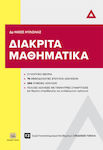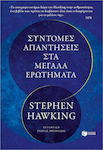Η μωρία των ανοήτων, The logic of deception and self-deception in human life
- Author: Robert Trivers
- Publisher: Katoptro
- Μορφή: Leather-Bound
- Έτος έκδοσης: 2016
- Αριθμός σελίδων: 600
- Κωδικός ISBN-13: 9786185111472
- Διαστάσεις: 14×21
Similar products



Scientific Books
Ο Μύθος Του Φυσιολογικού, Trauma, disease and healing in a toxic culture
Ad from SilverProductsAdded Top rated
Top rated Top rated
Top ratedScientific Books
Προς τ’ άστρα, A magical journey into the world of Astrophysics
Ad from MykyklosAdded
 Top rated
Top ratedScientific Books
Σύντομες απαντήσεις στα μεγάλα ερωτήματα, Brief answers to the big questions
Ad from SilverProductsAdded



Scientific Books
Ειδικότητα τεχνικός μηχανοτρονικής: Απαντήσεις στην τράπεζα θεμάτων του ΕΟΠΠΕΠ
from 9,75 €Added
All shops
Prices are calculated for:Luxembourg, Other Payment Options
- 23,45 €
- 23,85 €
- 27,03 €
- 28,62 €
- 27,00 €
- 23,74 €
Description
«The time has come to formulate, through the lens of evolutionary thinking, a general theory of deception and self-deception that applies to all species — and primarily to our own. We are passionate liars, even to ourselves. Language, the most valuable acquisition of our species, not only enhances our ability to lie but greatly expands its scope. We can lie about events distant in space and time, about the details and meaning of others' behavior, about our innermost thoughts and desires, and so on. But why self-deception? Why do we possess such marvelous sensory organs for detecting information if we are going to distort the incoming information as soon as it reaches the mind? [...] I wrote this book with a specific logical sequence in mind. I begin by developing the evolutionary logic and providing a concise overview of deception in Nature. Then, I address, in order, the neurophysiological characteristics of deception, induced self-deception, deceptive phenomena in the family and gender relations, the immunological and social-psychological implications of self-deception, and its impact on daily life and its various manifestations, including in aviation and space accidents, false historical narratives, war, religion, and the social sciences. I conclude with some thoughts on how we can combat self-deception in our personal lives. [...]» —From the Preface of the book They said about the book: • «A great book by a uniquely gifted scientist. Robert Trivers has a long tradition of producing extremely original ideas that have opened up various research avenues. His Darwinian theory of self-deception is perhaps his most provocative and interesting idea to date. Enriched with Trivers' vivid and clear writing style, the book is a source of delight. I highly recommend it.» — Richard Dawkins, Emeritus Professor of Biology, University of Oxford • «Great books include significant new ideas, and this one is no exception. What makes Trivers' book unusual even by the standards of great books is the density of new ideas. Like other great popular science books, The Folly of Fools presents a significant new idea in an enjoyable and accessible way. But the book does not stop there; it offers dozens of new hypotheses to those of us who have been working in the field for the past twenty years. In this sense, it is not just a science book for the general public, but also a significant contribution to the scholarly scientific literature.» — William von Hippel, Professor of Psychology, University of Queensland • «This is a subject that very few scientists tackle, perhaps because the degree of self-deception's penetration into our lives is, in itself, a subject of strong denial mechanisms. Nevertheless, Robert Trivers, one of the brightest minds in evolutionary biology, leaves us no room for escape. There is no doubt; reading the book will open your eyes.»
— Frans de Waal, professor of ethology, Emory University • "Robert Trivers has written a delightful, profound book about how our minds systematically create distorted perceptions of reality and how those, in turn, distort the way we present ourselves to others. It is a great contribution to psychology and social sciences in general, and will undoubtedly spark further scientific investigation into these important issues." — David Haig, professor of biology, Harvard University • "Why self-deception is favored by natural selection is a fascinating and enigmatic question. In his attempt to unravel the phenomenon, Robert Trivers draws examples from the world of insects to the world of international relations. The result is an original and important book, capable of inspiring thorough discussion, from one end of the globe to the other, on a topic that interests not only specialists but each and every one of us." — Richard Wrangham, professor of biological anthropology, Harvard University Some of the book's contents 1. THE EVOLUTIONARY LOGIC OF SELF-DECEPTION • The evolution of self-deception • What is self-deception? • Detecting deception in humans through cognitive load • Self-deception is older than language • Nine categories of self-deception • The characteristics of self-deception 2. DECEPTION IN NATURE • The co-evolutionary battle between deceiver and victim • An epic co-evolutionary battle • Intelligence and deception • Female mimics • Deceptive alarm calls • Camouflage • The awareness of deception in animals • Deception as an evolutionary game • A deeper theory of deception 3. NEUROPHYSIOLOGY AND INDUCED SELF-DECEPTION • Can one brain hemisphere hide from the other? • Implicit versus explicit self-esteem • False confessions, torture, and flattery • False memories of childhood abuse • Is self-deception the immune system of the mind? • Placebo treatments 4. SELF-DECEPTION IN THE FAMILY AND THE DIVIDED SELF • The conflict between parents and children • Genomic conflict • The effect of marital conflict on genetic conflict • Genomic conflict and self-deception • The influence of parents on children's deception 5. THE IMMUNOLOGY OF SELF-DECEPTION • What is the benefit of sex? • Deception and self-deception in courtship • Whose child is it? • The reactions of deceived men • Deception and the menstrual cycle • Does self-deception benefit or harm marriage? • The allure and danger of fantasies • The agony of betrayal 6. DECEPTION, SELF-DECEPTION, AND GENDER • The immune system costs • The importance of sleep • Homosexuality and the consequences of denial • Positive affect and immune function • The impact of music • The positivity of the elderly • An immunological theory of happiness 7. THE PSYCHOLOGY OF SELF-DECEPTION • Biased memory • Are all biases due to self-deception? • Denial and projection • Denial feeds denial • Cognitive dissonance and self-justification • The social effects of reducing cognitive dissonance 8. SELF-DECEPTION IN EVERYDAY LIFE • The metaphorical language of the stock market • Metaphorical language in everyday life • Playing dumb • Face projection • Unwanted electronic messages • Humor, laughter, and self-deception • Drugs and self-deception • Professional con artists • Lie detectors 9. SELF-DECEPTION IN AIR AND SPACE ACCIDENTS • Air Florida Flight 90 • Aeroflot Flight 593 • The American approach to security issues contributes to the September 11 attacks • The Challenger tragedy • The Columbia tragedy • EgyptAir denies everything • Rescue due to lack of self-deception? 10. FALSE HISTORICAL NARRATIVES • The false historical narrative of the USA • Exercising control through small wars and puppet governments • Educational history textbooks • Turkish denial of the Armenian genocide • Deception and self-deception of Arabs • Christian Zionism • What do false narratives serve? 11. SELF-DECEPTION AND WAR • The animal origins of war • Self-deception promotes war • The US war against Iraq • Can a war be won through bombings? • Bombs rewriting history • Bloodshed in Gaza • Self-deception and the history of war 12. RELIGION AND SELF-DECEPTION • Religion: a recipe for self-deception • Religion and health • Parasites and religious diversity • Why the bias against women? • Power corrupts • Religion preaches against self-deception • Is intercessory prayer effective? • Religion and support for suicide attacks • Religion, Phariseeism, war 13. SELF-DECEPTION AND THE STRUCTURE OF SOCIAL SCIENCES • Does the law of truth precede? • The success of science is based on tools against self-deception • The more social the field, the more its development is delayed • Are economists scientists? • Cultural anthropology • Psychoanalysis: self-deception in the study of self-deception • Self-deception distorts cognitive fields 14. FIGHTING SELF-DECEPTION IN OUR PERSONAL LIVES • A series of small victories leading to an overwhelming defeat • Correcting our biases • Why are we so compulsive? • The value of conscience • The danger of fantasies • On prayer and meditation • The value of friends and mental health counselors • The destructive power of display • An endless parodySpecifications
- Genre
- Logic
- Language
- Greek
- Subtitle
- The logic of deception and self-deception in human life
- Format
- Leather-Bound
- Number of Pages
- 600
- Release Date
- 6/2016
- Publication Date
- 2016
- Dimensions
- 14x21 cm
Important information
Specifications are collected from official manufacturer websites. Please verify the specifications before proceeding with your final purchase. If you notice any problem you can report it here.












